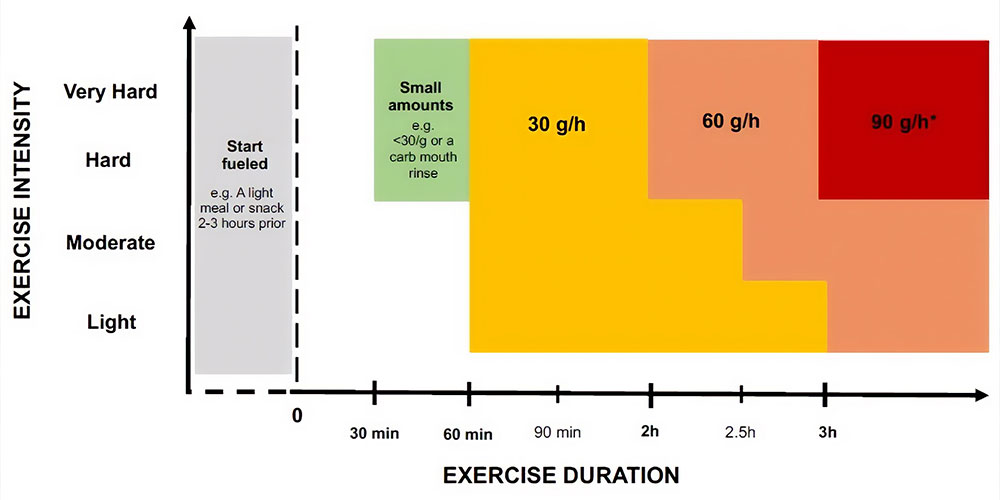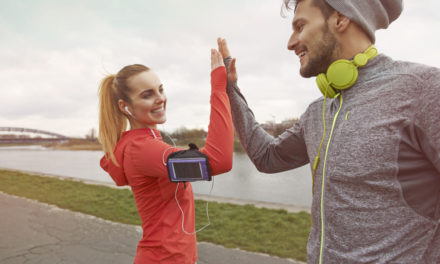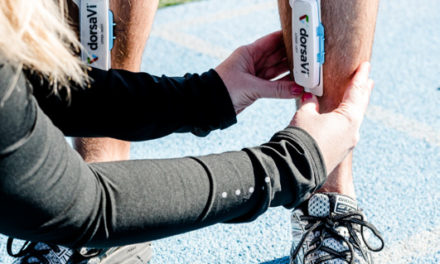In the fitness industry, many things tend to catch a bad rap: too much fat, salt, and carbs. The pendulum seems to swing to the next extreme every few years, but the warnings generally stem from recommendations for the general population. As an athlete, you are different, with different needs to fuel your training and recover from that training as quickly as possible. As we tell our athletes, you’re fueling for this session and the next.
I’m not a registered dietician or nutritionist, but I’ve been in the sports performance world for 15 years and have relationships with talented people that help us keep our clients fueled and hydrated. Whether you are a cyclist, runner, or triathlete, there’re basic targets for carb intake during exercise.
These targets span most endurance sports and have been a significant target for research over the last five years. These targets are the same regardless of size, gender, or sport. Most people have similar absorption rates when it comes to carb uptake. Evidence suggests people with less body mass benefit more from these higher carb targets than their larger training buddies.
Abby Coleman of Precision Fuel and Hydration provided this handy infographic: (Graphic in header)
For everyone looking to optimize performance, it’s recommended that you have a carb-dense snack or meal 2-3 hours before any exercise. This can easily be your typical breakfast or lunch, but if your exercise is more intense, watch out for too much fat, fiber, and protein in these meals. Those nutrients don’t digest as quickly as carbs and can sit heavy on your stomach.
Durations:
Under 30 min
If you’re doing 30 minutes or less, you should have plenty of glycogen stored to get you through your training, even if it’s really intense, as long as you’ve been eating normally.
30-60 min
Again, if you’ve been eating normally, you should have the glycogen stored to make it through the session without performance decline. However, there’s evidence that suggests a small amount of carbs or even just rinsing your mouth with a carb-based solution or sports drink can be beneficial.
1-2 hours
Here’s where lacking carbs can be tricky. Most people can store enough glycogen to power 90-120 minutes of moderate activity. Crank up the intensity, and you can blow through your glycogen, stored form of carbs, in a little over an hour. Keep it pretty light, and you might make it closer to 3 hours. Remember, we are looking to optimize our performance, so getting in 30-60g of carbs per hour is recommended. That’s not a calorie recommendation; it’s simply grams of carbs.
The source is up to you, but things with too much fat, fiber, and protein don’t digest as quickly, and they digest even slower when your body is pumping blood to the working muscles. So you have to find the right source, but the key is carbs.
2+ hours
If you’re going long, carbs are not something to neglect, and the longer you’re going, the more your deficits add up. So this is where the recommendations jump to 60-90g carbs per hour OR MORE. Take note:
- OR MORE means there have been some athletes who can intake more than 90g an hour, and it shows a positive trend in their blood glucose or ready-to-use fuel in the blood. Based on their feedback, they felt their energy stayed higher for the duration of their event relative to their previous fueling strategy. Olympic triathlon champion and Ironman record holder Kristian Blummenfelt has been known to take in over 100g of carbs per hour during his ultra events.
- Taking in this level of carbohydrates will likely take some training of your gut. Do you think Joey Chestnut took down 63 hot dogs on his first try? Lucky for you, carbs are easier to digest than mystery meat. As you get closer to your goal race, keep increasing your intake slowly until you’ve reached your range.
If you’re close to a goal race when you read this, you have time to increase your intake if needed and dial in your final fueling strategy. A major key to peak performance is practicing fueling exactly as you plan on race day. It’s not just something you can figure out the night before. Have a plan, tweak it, dial it in, and execute!
Dale Sanford is the co-founder of BPC Performance, Inc. and has been coaching endurance athletes all over the world since 2009. From first-timers to world championship competitors and everything in between. Dale is also BPC’s bike fit and movement specialist. He is an avid triathlete himself, earning USA Triathlon All-American honors and qualifying for the Ironman 70.3 World Championships. You can catch up with Dale @bpcperformance, bpcperformance.com, or listen to the Coaches on Couches Podcast.







